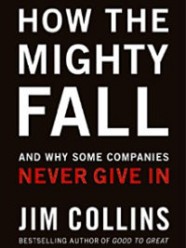Indexes - all Resources

A note on trader Sharpe ratios. (2009)
"Financial traders are assessed by how much money they make per unit of risk taken, known as the Sharpe Ratio.. a population of experienced traders attain Sharpe Ratios significantly higher than the broad market. John M. Coates Judge Business School, University of Cambridge, Cambridge, United Kingdom Lionel Page Westminster Business School, London, United Kingdom PLoS One 4: 8036 Traders in the fi...
Written by: Coates and Page.
Read moreHow the mighty fall: and why some companies never give in. (2009)
“Hubris born of success is the first of five stages of corporate decline.” Jim Collins, author, leadership & management practitioner, former Stanford University academic. Published by Collins Business Essentials. “If companies such as Bank of America, Motorola, Circuit City, Zenith A&P and Fannie Mae - icons that once served as paragons of excellence - can succumb to the forces of gravity, then no one is imm...
Written by: Collins, Jim.
Read more
Hubris syndrome: an acquired personality disorder? A study of US Presidents and UK Prime Ministers over the last 100 years. (May 2009)
"Qualities often associated with successful leadership can also be marked by impetuosity, a refusal to listen to or take advice and a particular form of incompetence when impulsivity, recklessness and frequent inattention to detail predominate. David Owen (Lord Owen), House of Lords, London Jonathon Davidson, Department of Psychiatry and Behavioural ...
Written by: Owen and Davidson.
Read moreUnsecured Ladders: meeting the challenge of the unexpected. (2009)
"We spend years climbing career ladders only to risk being brought down by unexpected events that were 'not in the plan'. Is this also inevitable? Graham Robinson, Visiting Research Fellow, Centre for Management Learning and Development, University of Surrey, UK John Harris, Management Consultant; Former Chief Executive of Calor plc.
Written by: Robinson, Graham and Harris, John.
Read more
Social hierarchy: the self-reinforcing nature of power and status. (2008)
"In this review, we revisit some basic psychological and sociological elements of hierarchy and argue that status and power are two important yet distinct bases of hierarchical differentiation. Magee, J.C., Robert F. Wagner Graduate School of Public Service, New York University Galinsky, A.D., Kellogg School of Management, Northwestern University Academy of Management Annals 2: 351-398. Hierarchy ...
Written by: Magee and Galinsky.
Read more
Power reduces the press of the situation: implications for creativity, conformity and dissonance. (2008)
"..explores whether power psychologically protects people from influence. ...experiments demonstrate that the powerful (a) generate creative ideas that are less influenced by salient examples, (b) express attitudes that conform less.... Galinsky, A.D., Northwestern University Magee, J. C., New York University Gruenfeld, D.H., Stanford University Whitson, J., University of Texas, Austin...
Written by: Galinsky, Magee, Gruenfeld et al.
Read more
The trouble with overconfidence. (2008)
"On difficult tasks, people overestimate their performance but also mistakenly believe that they are worse than others. On easy tasks, people underestimate their actual performances but mistakenly believe they are better than others. Moore, D.A., Carnegie Mellon University, Healy, P.J., Ohio State University Psychological Review 115: 502-517. The authors present a reconciliation of three distinct wa...
Written by: Moore and Healy.
Read more
Who makes acquisitions? CEO overconfidence and the market’s reaction. (2008)
"Overconfident CEOs over-estimate their ability to generate returns. As a result, they overpay for target companies and undertake value-destroying mergers. The effects are strongest if they have access to internal financing. Malmendier, U., University of California, Berkeley Tate, G., University of California at Los Angeles, Los Angeles Journal of Financial Economics 89: 20-43. Does CEO overconfide...
Written by: Malmendier and Tate.
Read more
Overconfidence, CEO selection, and corporate governance. (2008)
"...an overconfident manager, who sometimes makes value-destroying investments, has a higher likelihood than a rational manager of being deliberately promoted to CEO under value-maximizing corporate governance. Goel, A.M., DePaul University, Thakor, A.V., Washington University, St. Louis Journal of Finance 63(6): 2737-2784. The authors develop a model that shows that an overconfident manager, who som...
Written by: Goel and Thakor.
Read more
Are overconfident CEOs born or made? Evidence of self-attribution bias from frequent acquirers. (2008)
"Many CEOs overestimate their own negotiating skills and overlook the element of luck in successful mergers, acquisitions, and other deals. CEOs appear to overly attribute their role in successful deals, leading to more deals even though these subsequent deals are value destructive. Billet, M. & Qian, Y., University of Iowa Management Science 54(6): 1037-1051. Many CEOs overestimate their own negotiating sk...
Written by: Billet and Qian.
Read more






